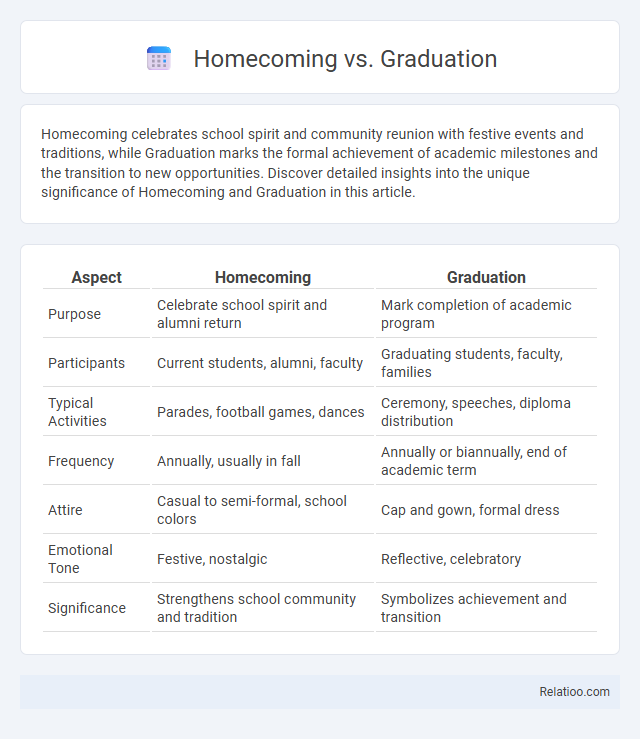Homecoming celebrates school spirit and community reunion with festive events and traditions, while Graduation marks the formal achievement of academic milestones and the transition to new opportunities. Discover detailed insights into the unique significance of Homecoming and Graduation in this article.
Table of Comparison
| Aspect | Homecoming | Graduation |
|---|---|---|
| Purpose | Celebrate school spirit and alumni return | Mark completion of academic program |
| Participants | Current students, alumni, faculty | Graduating students, faculty, families |
| Typical Activities | Parades, football games, dances | Ceremony, speeches, diploma distribution |
| Frequency | Annually, usually in fall | Annually or biannually, end of academic term |
| Attire | Casual to semi-formal, school colors | Cap and gown, formal dress |
| Emotional Tone | Festive, nostalgic | Reflective, celebratory |
| Significance | Strengthens school community and tradition | Symbolizes achievement and transition |
Understanding Homecoming: A School Tradition
Homecoming is a longstanding school tradition centered around welcoming alumni back to campus through events like football games, parades, and dances, fostering community spirit and school pride. Graduation marks the formal completion of academic requirements, celebrating student achievements with ceremonies often featuring diplomas, speeches, and caps and gowns. While homecoming emphasizes reunion and celebration of school culture, graduation focuses on academic accomplishment and transition to the next life stage.
Graduation Explained: Celebrating Academic Achievement
Graduation marks the culmination of your academic journey, symbolizing the successful completion of coursework and the earning of a degree or diploma. It is a formal ceremony that honors academic achievement, often featuring the conferring of degrees, speeches, and the wearing of caps and gowns. Unlike Homecoming, which centers on school spirit and community events, Graduation focuses explicitly on celebrating educational milestones.
Key Differences Between Homecoming and Graduation
Homecoming centers on school spirit and social celebration, marked by events like football games and dances, while Graduation symbolizes academic achievement and the completion of your educational journey. Homecoming fosters community and nostalgia within the current student body, whereas Graduation focuses on future opportunities and the transition to the next life stage. The key differences lie in their purpose, timing, and the emotions they evoke, with Homecoming being a festive reunion and Graduation a formal recognition of accomplishment.
The Purpose and Significance of Homecoming
Homecoming serves as a significant event that unites alumni, students, and faculty to celebrate school spirit and foster a sense of community. Unlike graduation, which marks the completion of academic milestones, homecoming emphasizes tradition and the ongoing relationship between past and present members of the institution. The purpose of homecoming centers on rekindling connections through activities such as parades, football games, and reunions, reinforcing pride and loyalty to the school.
The Meaning and Importance of Graduation Ceremonies
Graduation ceremonies symbolize the culmination of years of academic achievement, marking a pivotal milestone in Your educational journey. These events reflect personal growth, discipline, and the transition to new professional or academic opportunities. The significance of graduation lies in its role as a formal recognition of success, inspiring confidence and a sense of accomplishment.
Events and Activities: Homecoming vs Graduation
Homecoming events typically include parades, pep rallies, and football games, creating a festive atmosphere that celebrates school spirit and community togetherness. Graduation ceremonies focus on formal recognition of academic achievements, with speeches, diploma presentations, and cap-and-gown traditions marking the transition from student to graduate. While homecoming centers on social and athletic activities, graduation prioritizes academic milestones and ceremonial honors.
Who Participates: Attendees and Honorees
Homecoming primarily involves current students, alumni, and community members celebrating school spirit through events like parades and football games, with a focus on the Homecoming court as honorees. Graduation ceremonies feature graduating students as the main participants, along with faculty, family, and friends, honoring students who have completed academic requirements. While Homecoming welcomes a broad community audience, graduation centers on the individual achievements of students entering the next phase of their lives.
Dress Codes: What to Wear for Homecoming and Graduation
Homecoming dress codes typically encourage semi-formal attire such as cocktail dresses, skirts, and button-down shirts paired with khakis or dress pants, reflecting the festive and youthful spirit of the event. Graduation dress codes are more formal, often requiring caps and gowns over business casual or dressy outfits, emphasizing ceremony and achievement. For both occasions, comfort and appropriateness to the venue are key, with Homecoming allowing more expressive fashion choices compared to the traditional and uniform look expected at Graduation.
Emotional Impact: Homecoming vs Graduation Experiences
Homecoming fosters a vibrant emotional experience centered on community spirit, nostalgia, and celebration of school traditions, often marked by spirited events and reunions. Graduation carries a profound emotional weight of achievement, transition, and hope, symbolizing the culmination of academic efforts and the beginning of new life chapters. While Homecoming emphasizes connection and belonging, Graduation highlights personal growth and future aspirations.
Lasting Memories: The Legacy of Each Celebration
Homecoming creates lasting memories through spirited reunions, football games, and dances that rekindle school pride and strengthen alumni bonds. Graduation marks a pivotal life milestone, symbolizing academic achievement and the transition to new beginnings, leaving graduates with a profound sense of accomplishment. Each celebration's legacy endures by fostering community connection, honoring growth, and creating cherished moments that define personal and collective histories.

Infographic: Homecoming vs Graduation
 relatioo.com
relatioo.com